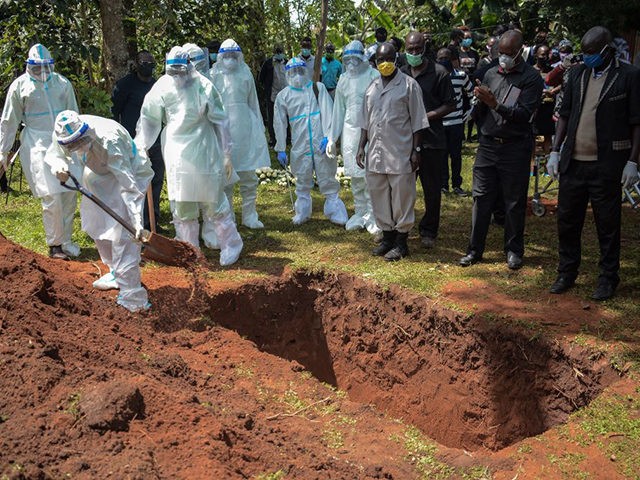Kenya’s largest doctors’ union protested the government welcoming more Cuban slave doctors to the country this week, who the union says will take positions that would greatly help 1,000 unemployed Kenyan doctors survive.
Kenya, like many countries in the developing world, has inked deals with the Castro regime to import doctors taught in Cuban schools. Such doctors do not receive a living wage and have no right to freely travel, see family, or otherwise exist without extreme government supervision. The Cuban slave doctor program nets the Communist Party an estimated $11 billion a year, the vast majority of which never reaches the doctors. Human Rights Watch referred to the slave doctor program as “draconian” and a violation of “fundamental rights” in a statement condemning it Wednesday.
In addition to not getting paid a fair wage and being deprived of basic rights, the doctors Cuba sends abroad are often forced to work in extremely dangerous conditions, going where local doctors are often either not allowed or won’t go. Kenya is a particularly stark case of this following the disappearance of two Cuban slave doctors last year near the border with Somalia. Kenyan and Cuban authorities believe the two doctors are being held hostage by the jihadist group al-Shabaab, which demanded a ransom the Cuban government presumably has no interest in paying, as the doctors remain missing.
While the Cuban slave doctor program has elicited outrage globally for the abuses inflicted on its doctors, in Kenya, local doctors have spent years urging Nairobi to simply hire the large number of domestic doctors looking for work in vain, pushed out of the medical job market by slaves from Cuba. Miami’s Martí News reported Wednesday that the Kenya Medical Practitioners, Pharmacists, and Dentists Union (KMPDU), which has been at the forefront of advocating for the Kenyan doctors, again issued statements against the government importing another 20 doctors, some specialists, into the country this week.
Acting Secretary-General Dr. Chibanzi Mwachonda of the KMPDU issued statements calling the arrival of the 20 Cuban doctors this week “in bad taste,” according to Kenya’s the Standard.
“The importation of the Cuban doctors by the government is in bad taste. We have health workers who are qualified and have been trained with the taxpayers’ money but the government is not considering them,” Mwachonda asserted during a regular briefing on the Chinese coronavirus crisis in the country.
In an interview with Kenya’s KTN News, Mwachonda elaborated, noting that Kenya is currently promoting domestic economic production through incentives for local manufacturers — a move rendered hypocritical by making it more difficult for Kenyan doctors to find work.
“We have seen the government to support [sic] local manufacturers for manufacturing PPEs [personal protective equipment], but then how do you not support your own doctors and bring onboard other doctors from other foreign countries?” Mwachonda asked. “Perhaps the government is passing a very strong message to Kenyan doctors that they do not need us and, if they do not need us, then the government needs to come out quite clearly on this, whether they require Kenyan doctors or not — and if they do not then we should take steps to ensure that we offer services elsewhere.”
KMPDU estimates that 1,000 doctors among its ranks are unemployed and proposed to the government of President Uhuru Kenyatta to hire 50 doctors per county nationwide.
Kenyan Health Minister Mutahi Kagwe explained last week that his government believed the newly arriving brigade of 20 Cuban slave doctors was necessary in light of the growing number of coronavirus cases in the country. Kenya has documented 15,601 cases of Chinese coronavirus at press time and only 260 deaths — a small number given its population of 51 million — but authorities have expressed concern that the number of known coronavirus cases is far lower than the actual number of affected people, due to a lack of proper testing or a robust healthcare system.
“It is a small brigade of 20 doctors who have come, specialists in their own area,” Kagwe said of the Cubans. “It’s just to come and exchange skills with our own doctors … and they also learn from us.”
Kenya initially intended the Cuban slave doctor program to go in one direction: the Cubans come to Kenya and share their service and expertise. Last year, however, Kenyan officials revealed that they found Cuba’s medical education to have significant shortcomings and the Cuban slave doctors to be ill-equipped to treat patients. Cuba offers intentionally substandard medical educations so that it can increase the number of slave doctors at its disposal. To solve the problem, Kenya turned the program into an “exchange” where Kenyan doctors who can competently conduct their work mentor the Cuban arrivals. The mentorship program again triggered the ire of local doctors, who asked why their colleagues remained unemployed.
The KMPDU has been fighting the latest rounds of Cuban slave doctor imports since 2018, when 100 Cubans arrived in the country.
“Kenya has 1,000 doctors who are not employed. They have waited for deployment since May 2017. There are additional specialists who have been waiting for deployment to counties. Is there room for these Drs in Kenya?” Ouma Oluga, Mwachonda’s predecessor, said at the time.
The KMPDU sued the government to prevent the Cubans from arriving but lost the legal challenge.

COMMENTS
Please let us know if you're having issues with commenting.